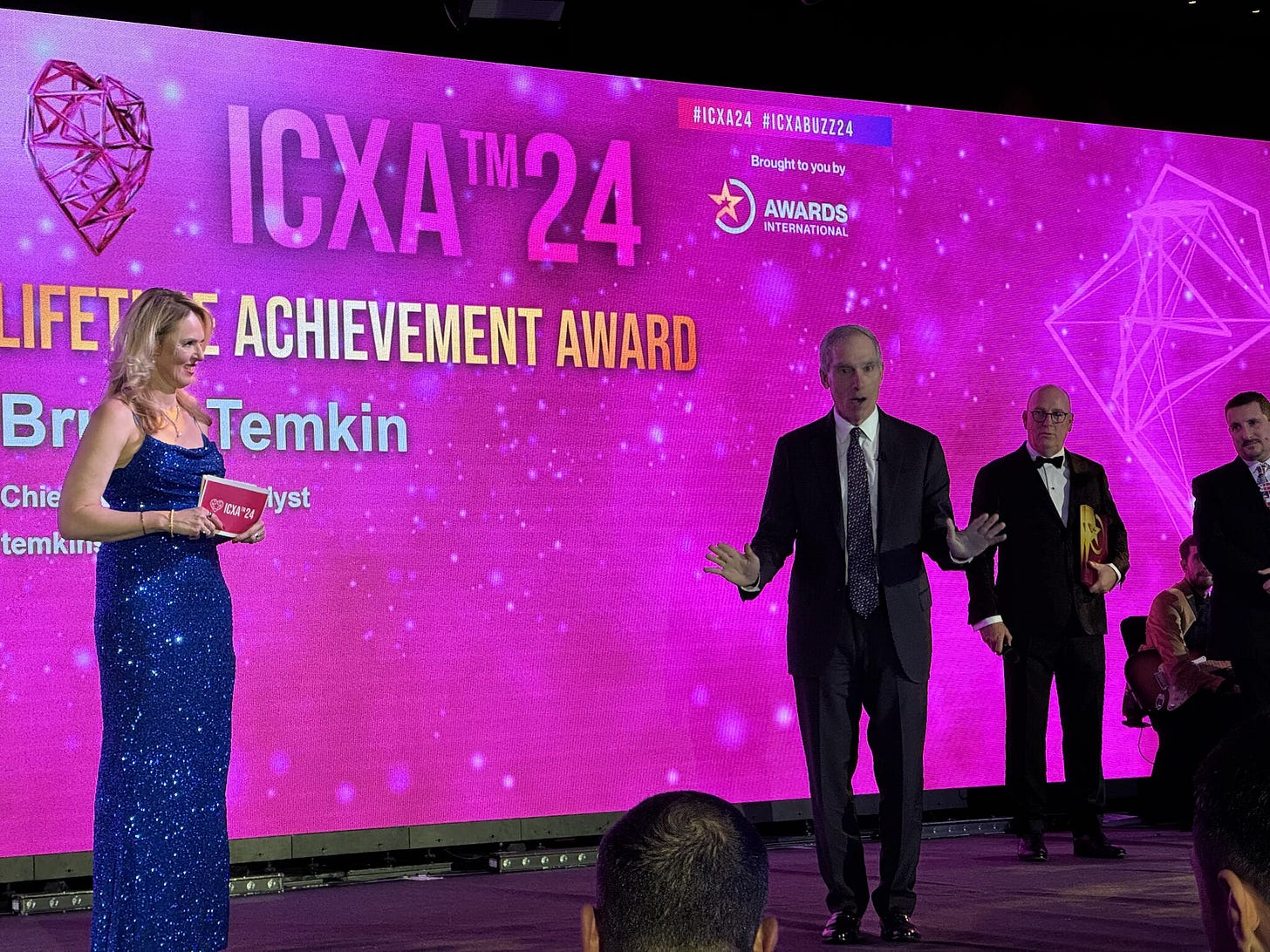
First of all, thank you for this award. I’m truly honored. Although, to be honest, I don’t think I’m old enough for a lifetime achievement award… and to be clear—my work is far from done.
I also want to take a moment to congratulate all the nominees and winners tonight. The incredible work being done in customer and employee experience is inspiring. Let’s give ourselves a well-deserved round of applause.
Back in the summer of 2010, I had what some might call a crazy idea—that Customer Experience could become a profession. That’s when we started sketching out the concept for the Customer Experience Professionals Association, which officially launched the following spring.
I know how challenging it can be to drive the change we all want to see. But let me tell you—we’ve come a long way since then.
Think about it: terms like voice of the customer programs, journey maps, moments of truth, experience design, and listening posts were barely on the radar 14 years ago. Today, they’re part of the everyday vocabulary in our field. We’ve built an impressive toolkit of capabilities and supporting technologies, and we’re surrounded by a worldwide network of exceptionally talented CX professionals.
In the last few years, I’ve visited dozens of countries, including India, Dubai, New Zealand, Australia, Malaysia, Canada, Spain, Italy, Germany, and of course the UK, and met CX pros everywhere I go. I’ve seen remarkable efforts to elevate customer and employee experiences.
As crazy as we might have seemed back in 2010, CX is now a global reality. And let me say this clearly: I’m incredibly proud of all of you.
But instead of basking in nostalgia, I’d like to share three thoughts about the future of our work—because the best is still ahead.
1. Experience is not a fad; it’s fundamental.
Human beings operate through three core systems: biological, psychological, and experiential. Our biology forms the foundation of our physical existence. Our psychology governs our thoughts, emotions, and mental processes. And the experiential system? That’s the input and output layer—it shapes how we perceive, interact with, and influence the world.
This means that delivering great experiences isn’t optional; it’s essential. The need for people like you who can help organizations understand stakeholders and meet their needs isn’t going anywhere—it’s only growing.
2. Being human-centric and delivering results are not opposites.
There’s a persistent—and misguided—belief among some executives that they have to choose between focusing on customer experience or achieving organizational goals. That’s a false trade-off.
Some of the blame lies with us, CX professionals, for talking about our work through the lens of metrics like NPS or simply “creating great experiences.” At its core, experience management is about delivering the right experiences to help leaders achieve their goals.
It’s time to reposition our work—not as an alternative to success, but as a critical enabler of it.
3. Times of change should accelerate our work, not detract from it.
I first saw the true power of CX during the 2008 recession, when I was at Forrester Research. While many areas were shrinking, my CX practice was growing. Leaders needed guidance to navigate those difficult times, and CX became the differentiator.
Today, the same principle applies. In times of change—whether economic, technological, or cultural—our work becomes even more vital. Every decision an organization makes can be improved by a deeper understanding of the human beings it touches: customers, employees, and partners.
As many of you know, I left Qualtrics earlier this year. My goal now is to drive even greater change in the world.
That’s why I’m launching “Humanity at Scale”—a movement to create more human-centric organizations.
Here’s what it’s all about:
- First, we aim to raise empathy by helping leaders understand the emotions and behaviors that drive people.
- Next, we want to inspire ambition in leaders to positively impact everyone they touch—customers, employees, and communities.
- We’ll also spread practices that empower leaders to succeed by embracing positive intentions, purpose, and empathy.
- And finally, we’ll promote human-centered technology, ensuring innovations like AI uplift humanity, not undermine it.
Keep an eye out for the official launch in January.
I’ll leave you with one of my favorite quotes from Steve Jobs:
“The people who are crazy enough to think they can change the world are the ones who do.”
Let’s keep being those crazy people. Together, I know we can make the world a better place.
Thank you!